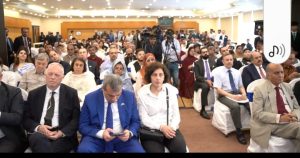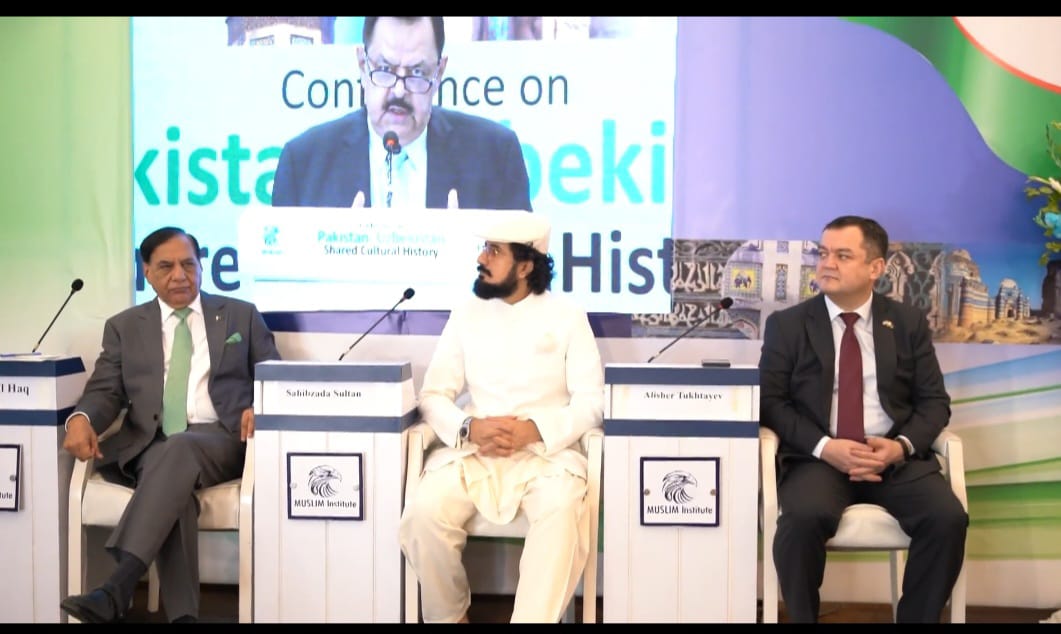ISLAMABAD ( WNAM REPORT ): MUSLIM Institute Islamabad in collaboration with Embassy of Uzbekistan organized an international conference on “Pakistan-Uzbekistan Shared Cultural History” at Islamabad club to shedding light on the rich historical and cultural ties between the two nations. The event highlighted the significance of preserving cultural heritage in both of the countries and emphasized the need for enhanced cooperation between Central Asia and rest of the world. As the Islamic heritage of sub-continent based on centuries, so the conference speaker accentuated to save this historical and cultural heritage from India’s Hindutva ideology.
The speakers at the seminar pointed out that the relationship between Pakistan and Uzbekistan is not just diplomatic or political, but is rooted in their old civilizations, intellectual exchange, and a shared Sufi traditions. They noted that Pakistan’s existence can be traced back to the day when Qutb-ud-Din Aibak founded the state in the subcontinent i.e. Lodi Empire and after that Mughal Empire was established, with its intellectual and cultural foundations deeply intertwined with Afghan and Turkish history.
The speakers observed that the cultural traditions of the subcontinent have deep roots with the Central Asian countries. They highlighted that India’s Hindutva-driven policies are distorting Mughal history by renaming monuments and erasing Timurid-Mughal heritage from textbook curriculum. The ultimate aim is to eliminate Muslim culture heritage-tied to the Central Asia. The speakers urged Central Asia as whole; to come together and make joint efforts to preserve its rich cultural heritage. Among the distinguished speakers there were, His Eminence Sultan Muhammad Ali-Founder of the MUSLIM Institute; Sardar Masood Khan-former President of Azad Jammu and Kashmir; General (Retd.) Ehsanul Haq-former Chairman Joint Chiefs of Staff Committee; Dr. Azmat Ziyo-Member of the Senate of Uzbekistan and Director of the Institute of History and Sciences; Sahibzada Sultan Ahmed Ali-Chairman of the MUSLIM Institute; His Excellency Ali Shir Takhtiyav-Ambassador of Uzbekistan; Major General (Retd.) Khalid Amir Jafari-President of the Center for South Asia and International Studies; Former Deputy Ambassador Sarfraz Ahmed Supra; Dr. Zafar Nawaz Jaspal-Dean of the Faculty of Social Sciences at QAU; Dr. Uzma Siraj-Director at NACTA; Dr. Odil Zaripov-Scientific Security Officer at the Institute of History and Sciences, Uzbekistan; Botir Yuldashev-Research Fellow at the Institute of History and Sciences; and Dr. Saira Alvi and Dr. Shujahat Hashmi-the moderators.
The speakers emphasized that Pakistan and Uzbekistan have many joint ventures in different areas like defense, agriculture, student-faculty exchange programs etc. The cultural partnership between the two nations extends to the defense sector by naming its missiles such as Babur, Ghori, and Ghaznavi etc. Furthermore, Pakistan has trained Uzbekistani pilots and should also consider supplying JF-17 aircraft to Uzbekistan and many more.
The relationship between Pakistan and Uzbekistan is extending to public diplomacy, educational collaboration, and tourism promotion. In conclusion, the speakers stressed the importance of preserving historical manuscripts, undertaking translation projects, and organizing joint cultural events to bring the people of both nations closer. However, there are many prospects for the central Asia to get benefits by launching Co-operational ties in strategic and economic programs. The seminar also featured a question-and-answer session, and the speakers were presented with commemorative plaques. Researchers and experts from various universities and think tanks across the country attended the conference.
Pakistan, Uzbekistan ties not just diplomatic or political, but rooted in their old civilizations: Speakers
23

